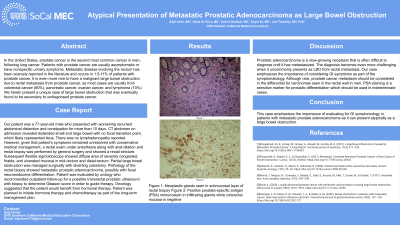Back


Poster Session E - Tuesday Afternoon
Category: Colon
E0125 - Atypical Presentation of Metastatic Prostatic Adenocarcinoma as Large Bowel Obstruction
Tuesday, October 25, 2022
3:00 PM – 5:00 PM ET
Location: Crown Ballroom

Has Audio
- SA
Sajni Amin, MD
UHS SoCal MEC
Temecula, CA
Presenting Author(s)
Sajni Amin, MD1, Sadie De Silva, MD1, Galvin Dhaliwal, MD1, Duyet Vo, MD2, Joel Trambley, MD, PhD1
1UHS SoCal MEC, Temecula, CA; 2Rancho Springs Medical Center, Murrieta, CA
Introduction: In the United States, prostate cancer is the second most common cancer in men, following lung cancer. Patients with prostate cancer are usually asymptomatic or have nonspecific urinary symptoms. Metastatic disease involving the rectum has been scarcely reported in the literature and occurs in 1.5-11% of patients with prostate cancer. It is even more rare to have a malignant large bowel obstruction due to rectal metastasis from prostate cancer, as most cases are usually from colorectal cancer (60%), pancreatic cancer, ovarian cancer, and lymphoma (10%). We herein present a unique case of large bowel obstruction that was eventually found to be secondary to undiagnosed prostate cancer.
Case Description/Methods: Our patient was a 77-year-old male who presented with worsening recurrent abdominal distention and constipation for more than 10 days. CT abdomen on admission revealed distended small and large bowel with no focal transition point, which likely represented ileus. There was no lymphadenopathy reported. However, given that patient’s symptoms remained unresolved with conservative medical management, a rectal exam under anesthesia along with anal dilation and rectal biopsy was performed by general surgery and showed a rectal stricture. Subsequent flexible sigmoidoscopy with GI showed diffuse area of severely congested, friable, and ulcerated mucosa in mid-rectum and distal-rectum. Partial large bowel obstruction was managed surgically with diverting colostomy. Pathology of the rectal biopsy showed metastatic prostatic adenocarcinoma, possibly with focal neuroendocrine differentiation. Patient was evaluated by urology who recommended outpatient follow-up for a possible transrectal prostatic ultrasound with biopsy to Gleason score to help guide treatment. Oncology suggested that the patient would benefit from hormonal therapy. Patient was planned to start on hormone therapy and chemotherapy as part of the long-term management plan.
Discussion: Prostatic adenocarcinoma is a slow-growing neoplasm that is often difficult to diagnose until it has metastasized. The diagnosis becomes even more challenging when it uncommonly presents as LBO from rectal metastasis. Our case emphasizes the importance of considering GI symptoms as part of the symptomatology. Although rare, prostate cancer metastasis should be considered in the differential for carcinomas seen in the rectal wall in men with PSA staining as a sensitive marker for prostatic differentiation that should be used in indeterminate cases.

Disclosures:
Sajni Amin, MD1, Sadie De Silva, MD1, Galvin Dhaliwal, MD1, Duyet Vo, MD2, Joel Trambley, MD, PhD1. E0125 - Atypical Presentation of Metastatic Prostatic Adenocarcinoma as Large Bowel Obstruction, ACG 2022 Annual Scientific Meeting Abstracts. Charlotte, NC: American College of Gastroenterology.
1UHS SoCal MEC, Temecula, CA; 2Rancho Springs Medical Center, Murrieta, CA
Introduction: In the United States, prostate cancer is the second most common cancer in men, following lung cancer. Patients with prostate cancer are usually asymptomatic or have nonspecific urinary symptoms. Metastatic disease involving the rectum has been scarcely reported in the literature and occurs in 1.5-11% of patients with prostate cancer. It is even more rare to have a malignant large bowel obstruction due to rectal metastasis from prostate cancer, as most cases are usually from colorectal cancer (60%), pancreatic cancer, ovarian cancer, and lymphoma (10%). We herein present a unique case of large bowel obstruction that was eventually found to be secondary to undiagnosed prostate cancer.
Case Description/Methods: Our patient was a 77-year-old male who presented with worsening recurrent abdominal distention and constipation for more than 10 days. CT abdomen on admission revealed distended small and large bowel with no focal transition point, which likely represented ileus. There was no lymphadenopathy reported. However, given that patient’s symptoms remained unresolved with conservative medical management, a rectal exam under anesthesia along with anal dilation and rectal biopsy was performed by general surgery and showed a rectal stricture. Subsequent flexible sigmoidoscopy with GI showed diffuse area of severely congested, friable, and ulcerated mucosa in mid-rectum and distal-rectum. Partial large bowel obstruction was managed surgically with diverting colostomy. Pathology of the rectal biopsy showed metastatic prostatic adenocarcinoma, possibly with focal neuroendocrine differentiation. Patient was evaluated by urology who recommended outpatient follow-up for a possible transrectal prostatic ultrasound with biopsy to Gleason score to help guide treatment. Oncology suggested that the patient would benefit from hormonal therapy. Patient was planned to start on hormone therapy and chemotherapy as part of the long-term management plan.
Discussion: Prostatic adenocarcinoma is a slow-growing neoplasm that is often difficult to diagnose until it has metastasized. The diagnosis becomes even more challenging when it uncommonly presents as LBO from rectal metastasis. Our case emphasizes the importance of considering GI symptoms as part of the symptomatology. Although rare, prostate cancer metastasis should be considered in the differential for carcinomas seen in the rectal wall in men with PSA staining as a sensitive marker for prostatic differentiation that should be used in indeterminate cases.

Figure: Figure 1: Neoplastic glands seen in submucosal layer of rectal biopsy
Figure 2: Positive prostate-specific antigen (PSA) immunostain in infiltrating glands while colorectal mucosa is negative
Figure 2: Positive prostate-specific antigen (PSA) immunostain in infiltrating glands while colorectal mucosa is negative
Disclosures:
Sajni Amin indicated no relevant financial relationships.
Sadie De Silva indicated no relevant financial relationships.
Galvin Dhaliwal indicated no relevant financial relationships.
Duyet Vo indicated no relevant financial relationships.
Joel Trambley indicated no relevant financial relationships.
Sajni Amin, MD1, Sadie De Silva, MD1, Galvin Dhaliwal, MD1, Duyet Vo, MD2, Joel Trambley, MD, PhD1. E0125 - Atypical Presentation of Metastatic Prostatic Adenocarcinoma as Large Bowel Obstruction, ACG 2022 Annual Scientific Meeting Abstracts. Charlotte, NC: American College of Gastroenterology.
